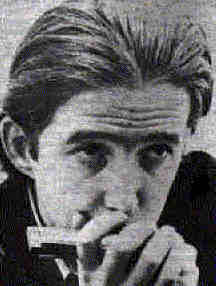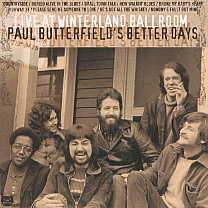

1942 -1987
Paul Butterfield was born on December
17, 1942, he studied classical flute for ten years. During high school Paul took up the
harmonica, and by the time he was 16, he was playing in some of Chicago's best South Side
blues clubs. Such blues legends as Howlin' Wolf and little Walter let Butterfield jam with
them. His fiery solos awed the audience. How could a skinny white kid play the blues with
the same ferver as an old time black blues man from mississippi?
Paul attended the University of Chicago, where he met Elvin Bishop. Together
they formed the six-member Butterfield Blues Band. In the mid 1960s, they were one of the
most popular and controversial bands in Chicago. The controversy centered around the
belief of blues traditionalists that using amplification and blending folk, jazz, and rock
with blues was heresy. Butterfield's band was not a blues band according to
traditionalists, but the kids who flocked to the group's concerts did not care.
The record companies also took notice. In 1965 Butterfield Blues Band
was released on Elektra label. Guitarist Mike Bloomfield joined the group for recording
sessions. At the Newport Folk Festival in Rhode Island, Butterfield's band blew the house
down, stealing the show away from Bob Dylan. The band were gaining a good reputation, but
the were not yet nationally known stars.
In 1967 the band was transformed by the addition of horns. Charles Dinwiddie
on tenor sax, Keith Johnson on trumpet, and David Sanborn on alto sax made up the extended
line up. This version of the band released two albums. They were critically well received
but did not sell especially well. Bishop left the group in 1968, and Butterfield attempted
to reorganize his band. By 1971 only Sanborn and Dinwiddie were left. Playing with this
band, Butterfield achieved a large cult following.
In 1972 Paul decided to make a serious attempt to the largest possible
audience. The Butterfield Blues Band became Paul Butterfield's Better Days. From 1972
until 1981, the group recorded for the Bearsville label. The band made several albums but
none were very successful, so paul again changed his line up.
In 1981 Paul was stricken by an attack of diverticulitis, which caused his
intestines to burst. his serious illness kept him away from playing for four long years.
When Butterfield tried to return to the studio, he encountered financial problems.
Bearsville would not fund his project. Eventually, he found backing from Amherst Records
of Buffalo, New York. Paul Butterfield Rides Again was released in 1986.
Paul Butterfield was found dead in his North Hollywood apartment on May4,
1987. His friends felt that he had died because there was just no more fight left in him.
Although Butterfield did not reach the kind of audience he would have liked, he influenced
several great blues men, including Robert Cray and Stevie Ray Vaughn.

Paul Butterfield, 4th from left with beard and leather jacket